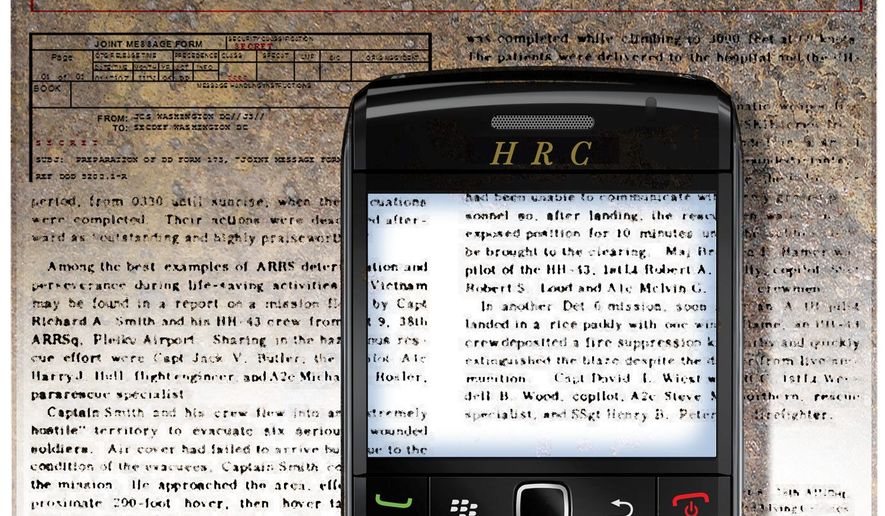OPINION:
When I write an op-ed — including this one — I am required to submit a draft to the CIA’s Pre-publication Review Board and also the security officer at the U.S. Senate Select Committee on Intelligence. This is to make sure that I don’t inadvertently disclose something that I learned when I had access to highly classified information. Actually, I very much respect this process, because it protects me as well as the government.
Anyone who has ever held a Special Intelligence/Talent Keyhole (SI/TK) clearance — which is granted by the CIA — is required to do this for life, and the obligation comes from the agreement one signs in order to be granted access to that category of information. I first signed such an agreement almost 35 years ago and a similar one when I was general counsel for the Senate Select Committee on Intelligence.
Why so careful? Simple: SI/TK information is classified by virtue of how it was obtained, or it’s “sources and methods,” which often are far more important to protect than the actual information itself.
Can we assume that Hillary Clinton — certainly when she was secretary of state — signed these same kinds of papers, together with getting a briefing on what SI/TK meant and the obligations accruing from her accesses thereto? Yes, and I have been physically present when Cabinet-level officers have been briefed and signed such papers. Absolutely no one is exempt. It is simply a condition required for access to that category of information — again, no one is exempt.
And in the State Department, as in all other parts of the government, there are special channels for “that category of information,” specific people appointed to have custody of the information, and they must account for every piece of it.
Can we also assume that some of Mrs. Clinton’s closest “handlers” and her “personal staff” also had SI/TK clearances and access to these categories of information? Yes, but it is highly doubtful that they were also the official custodians and accountable for the documents or information themselves — that function is typically performed by information security professionals.
The second part of this basic equation is that Mrs. Clinton, because of her position alone, was also designated as a “classification authority” in that she had the authority to classify — and declassify — “ordinary” classified information by virtue of her senior position. I have been a “classification authority” several different times and in different agencies. However, there is one important caveat to this status: One can neither classify nor declassify information that is specifically controlled by another agency, e.g., SI/TK information. There are other specialized categories of classified information that must be treated similarly — for example, information about nuclear weapons, which is specifically classified and controlled by the Department of Energy.
Applying this matrix to the facts as we know them to be, the results are both simple and startling — and probably more than enough to take Mrs. Clinton out of serious presidential contention, if not subject her to administrative sanctions or even criminal prosecution.
First, neither Mrs. Clinton nor any of her personal handlers could have “declassified” any SI/TK information that they were allowed to read or see. If they removed the labels from it or incorporated it in an email — even in an internal State Department email system — they would have violated the basic terms of their access and would be subject to penalties, not to mention loss of their security clearances.
Second, any SI/TK information that somehow got onto Mrs. Clinton’s so-called “private server” email account is a similar violation with similar sanctions. There is simply no explanation or excuse for this if it happened, and if it did, it indicates carelessness in the “gross negligence” category.
Third., if there is any explanation of how such a transgression could have occurred, it may have happened because one of Mrs. Clinton’s close personal assistants “cleaned up” a highly classified or sourced document, perhaps lifting paragraphs out of it, deleting its classification labels and categories, then sending it to her. Even then, any rookie in any national security-related job would have known that he or she was improperly receiving classified information. Are there internal classified systems at State that allowed Mrs. Clinton to send and receive classified information? Sure, but it doesn’t appear that she used these as much as her “private” unclassified email account with an unclassified private server. Even internal agency systems that allow classified traffic are separate from those that are approved for SI/TK-sourced information.
So, even if this last category were the “real” explanation of what Mrs. Clinton actually did and why she did it, she still would be subject to sanctions and lose her security clearances because of it. Again, any rookie understands that.
• Daniel Gallington served in senior national security positions in the Office of the Secretary of Defense, the Department of Justice and as bipartisan general counsel for the U.S. Senate Select Committee on Intelligence.




Please read our comment policy before commenting.